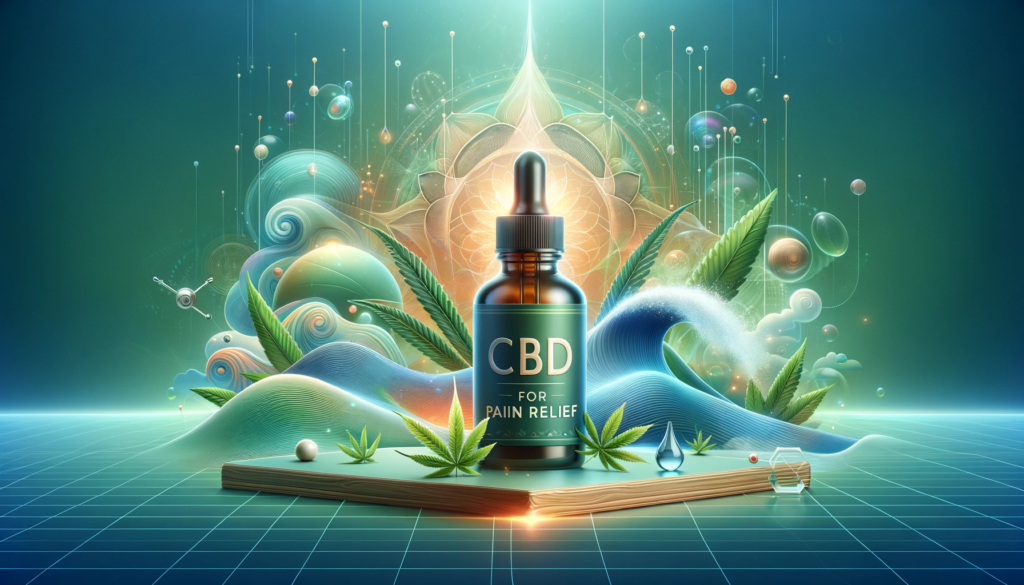Introduction
In the landscape of alternative health solutions, CBD oil has emerged as a frontrunner for those seeking relief from pain and anxiety. This non-psychoactive derivative of the cannabis plant offers the therapeutic benefits of cannabinoids without the high associated with THC. This article delves into the effectiveness of CBD oil in managing pain and anxiety, supported by scientific evidence and practical applications.
The Essence of CBD Oil
Origin and Nature
CBD, or Cannabidiol, extracted from cannabis and hemp plants, stands out among the many cannabinoids due to its non-intoxicating properties. Its appeal lies in the therapeutic potential without the psychoactive effects characteristic of THC.
Interaction with the Body
CBD engages with the body’s endocannabinoid system (ECS), playing a crucial role in regulating pain, mood, and sleep. This interaction involves influencing cannabinoid receptor activity and possibly interacting with serotonin receptors, vital for mood regulation.
CBD Oil in Pain Management

CBD oil’s role in pain management has garnered significant interest in the medical and wellness communities. This natural compound, extracted from cannabis plants, is gaining recognition for its potential to offer relief in various pain-related conditions without the side effects commonly associated with conventional pain medications.
Mechanism of Action
CBD interacts with the body’s endocannabinoid system (ECS), which plays a pivotal role in regulating pain and inflammation. By influencing ECS activity, CBD may help modulate pain signals sent to the brain, offering a potential therapeutic effect. This interaction is particularly relevant in chronic pain conditions, where the ECS’s functioning can be dysregulated.
Scope of Effectiveness
Research has suggested that CBD can be effective in managing different types of chronic pain, including neuropathic pain, which is often resistant to other treatments. For instance, studies indicate its potential benefits in conditions like fibromyalgia, arthritis, and migraines, where inflammation and pain are predominant symptoms. Moreover, CBD’s anti-inflammatory properties are believed to play a crucial role in its pain-relieving effects.
Natural Alternative
Many patients seek CBD oil as a natural alternative to traditional pain medications, which can have adverse side effects and the risk of dependency. CBD offers a promising route for those looking for more holistic approaches to pain management, with a generally well-tolerated profile and minimal side effects.
The growing interest in CBD oil for pain management is supported by anecdotal evidence and a burgeoning body of research. However, it is important to approach its use with careful consideration and ideally under medical guidance, especially for individuals with complex health conditions or those taking other medications.
CBD Oil’s Role in Alleviating Anxiety
CBD oil’s potential in alleviating anxiety represents a significant area of interest in both scientific research and alternative therapy. The anxiolytic properties of CBD, a naturally occurring compound in cannabis plants, have shown promise in various studies targeting anxiety-related disorders.
Mechanism of Action
CBD is thought to affect the brain’s response to serotonin, a neurotransmitter key to mood regulation. This interaction occurs through CBD’s influence on CB1 and CB2 receptors in the brain, which are part of the endocannabinoid system. By modulating these receptors, CBD may enhance serotonin receptor signaling, leading to reduced anxiety.
Research and Efficacy
Several studies have highlighted CBD’s potential in treating conditions like generalized anxiety disorder (GAD), social anxiety disorder, and panic disorder. For instance, a 2019 study demonstrated reduced anxiety levels in teenagers with social anxiety when treated with CBD. Moreover, CBD has been explored as a treatment for PTSD, showcasing its ability to alleviate anxiety-related symptoms.
A Natural Approach
Many individuals are turning to CBD oil as a natural alternative to traditional anxiolytics, which can have side effects and addictive potential. CBD’s appeal lies in its minimal side effects and non-psychoactive nature, making it a viable option for those seeking a holistic approach to managing anxiety.
While CBD oil offers a promising avenue for anxiety relief, it is important to consult healthcare professionals for guidance, particularly in cases of severe anxiety or when other medications are involved. This ensures a safe and tailored approach to using CBD as part of an anxiety management strategy.
Determining the Right Dosage
Dosage is highly individualized, and influenced by body weight, symptom severity, and personal body chemistry. It is advisable to start with a lower dosage and increase it gradually to find the desired effect.
Considerations for Safety and Side Effects
CBD is renowned for its high tolerability and low incidence of side effects, making it a favored choice for many seeking natural remedies. However, like any supplement, it can cause mild side effects in some users. Commonly reported issues include fatigue, which can impact daily energy levels, changes in appetite, either increased or decreased and digestive disturbances such as diarrhea or upset stomach. Importantly, CBD can also interact with various medications, altering their effectiveness or leading to unintended side effects.
Therefore, it is crucial for individuals considering CBD use, especially those on other medications, to consult with healthcare professionals to ensure safe and informed use. This step is vital in preventing adverse interactions and tailoring CBD use to individual health needs and circumstances.
Navigating Legal and Quality Issues
Navigating the legal and quality landscape of CBD oil is crucial for safe and effective use. The legality of CBD varies globally, often hinging on its source (hemp vs. cannabis) and THC content. In regions where it’s legal, ensuring the quality of CBD products is paramount. Consumers should seek high-quality, third-party-tested CBD to guarantee purity and potency.
It’s essential to be vigilant about product labeling, especially concerning THC content and CBD concentration. Quality assurance mitigates risks associated with contaminants or mislabeling, ensuring users receive the therapeutic benefits of CBD without legal concerns or unintended health risks.
Conclusion
CBD oil presents a promising, natural path for those grappling with pain and anxiety. Its potential for relief, coupled with a favorable safety profile, makes it an attractive alternative to holistic health. As research continues to unfold, the role of CBD in managing pain and anxiety becomes increasingly clear.

